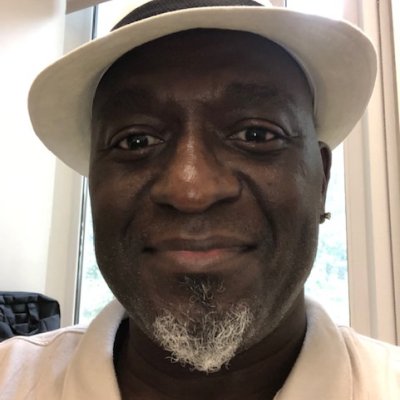El-Ra Adair Radney

PhD in African American & African Studies from Michigan State University
About
As a native of Detroit, Professor El-Ra Adair Radney’s background was already solidified in the Pan African/Afrocentric aesthetics and currents of Detroit’s Black community by his middle school years. One of those formative occasions was a 6th-grade trip to see a performance of the Afrofuturist musician Sun Ra. Hence, a strong sense of Black pride, positive connections to Africa, and Black political socialization had been cultivated in him early on from the intellectual activists, and Black (performing) Arts aesthetic pulse that had resonated from the front porch to the record shop, to the barbershop and from the influence of several ‘Black consciousness’ educators.
Since Dr. Radney was a kid growing up in Detroit, his family nicknamed him ‘Professor’. It was during his undergraduate years as a major in African American Studies under the instruction of inspirational professors, who taught from the wellspring of the Black diasporic experience, that he decided to make the nickname his profession. For him, these professors signaled the transformative power of Africana Studies to the bedrock of Black lives, locally and transnationally. In that light, Dr. Radney’s passion is to teach and use Africana Studies as a way to empower and encourage students and the world alike to foster positive development in the interests of the African Diaspora.
His teaching experience, scholarship, and professional development in Africana Studies is very much established in the state of Michigan, where he has taught and held several instructional positions, in departments of Africana Studies, Africology, and African American Studies collectively at Wayne State University, Eastern Michigan University, Michigan State University, University of Detroit-Mercy, and the University of Michigan, Flint, and Dearborn campuses. This collective body of teaching and research in higher education spans 13 years, from 2006 – 2019.
Dr. Radney’s dissertation is titled, Pan African Agency & the Cultural Political Economy of the Black City: The Case of the African World Festival in Detroit. His current publishing agenda is to transform the dissertation’s central topics into his first scholarly published monograph, which he hopes also will be a book suitable for mass public reading. Dr. Radney’s forthcoming book thus will focus on his dissertation research and is tentatively titled: African American Redemption in the Pan-African Metropolis of Detroit.
This primary research documents Pan African informed-cultural traditions that are maintained through annual Black festival traditions and Black cultural geographies, which showcase music, dance, spoken word, fashion, holistic health, cultural entrepreneurship, and culinary expression. His objects of study are Black diaspora institutions, such as Detroit’s African World Festival, Oakland’s Pan African Festival, and Houston’s FESTAC, which present opportunities for exchange and building positive community bridges between continental Africans, Afro-Caribbeans, African Americans, Afro-British, Afro-Latines, Afro-Haitians, and other African descendant-global members. Thus, his work illustrates how popular cultural practices preserve African heritage as a cultural political economy, ways of fighting oppression, and as Black urban placemaking. His chronology begins with the footprint of Marcus Garvey on the Black community (the 1920s) and moves through successive generations of Black aesthetic and social movements.
His PhD training is in African American and African Studies (AAAS) and his specialized niche includes four main topics of intersection: Black Political Theory, Cultural Studies, Urban Study, and Africana Philosophy. Dr. Radney finds one of his most meaningful inspirations in the guidance model of African American Studies scholar, James Stewart, whereby Stewart asserts that Africana Studies must operate as a vehicle for positive social change and psychological reorientation with a connected, not disconnected functional relationship to Black communities (2002). This purpose-driven teaching philosophy is also influenced by Garvey’s interdisciplinary contribution to the foundation of Black psychology, wherein Garvey asserts that the most crucial “battlefield” is recapturing the ‘lost right mind’ of Black people.
His core research orientation in Black political thought and cultural political economy became the foundation for his dissertation study wherein he examined how Black culture and African heritage preservation in Detroit connects to Black politics, psychological cohesion, and philosophy as a form of Pan-African agency in the Black city. During this course of study, he conceived of Detroit as ‘Pan African Detroit’ and originated the concept of the Pan African Metropolis.
With a Doctoral degree in African American/African Studies, and as an African American Studies generalist, Black cultural historian, and political theorist, Dr. Radney is trained in a range of Black film, Black music history, cultural phenomena, and political philosophies, which privilege the experience and people of the African Diaspora. This professional training provided expansive intersections for the contribution of African American women, and thus the integration of Black feminist and Black women’s standpoint theory. As an African American teacher/scholar, he feels a special responsibility to provide a corrective-discursive experience in an inclusive learning environment that is aligned with the Black Studies tradition of progressive education and academic rigor.
His pedagogical mission is to create an enlightening educational experience, in the hopes of peeling away “the old clothing” (McCluskey, 2008) of scientific racism, linguistic slavery, low racial esteem, Black Accommodationism, and historical reductionism that have informed social science methodologies in their study of the Black city, the everyday lives of people of color, and the African Diaspora’s modern world contribution. Dr. Radney holds a BA in Africana Studies from Wayne State University, an MBA from Davenport University, and a PhD in African American & African Studies from Michigan State University. His first article, A Place in the Sun: Black Placemaking in Pan African Detroit is published in The Journal of Black Studies, where he is also periodically a called-on Reviewer. His second article, Why African American Philosophy Matters is published in Philosophia Africana. He is also currently working on an article-manuscript series (in four parts) that will introduce some key concepts of his forthcoming book, which he will be touching on today.


